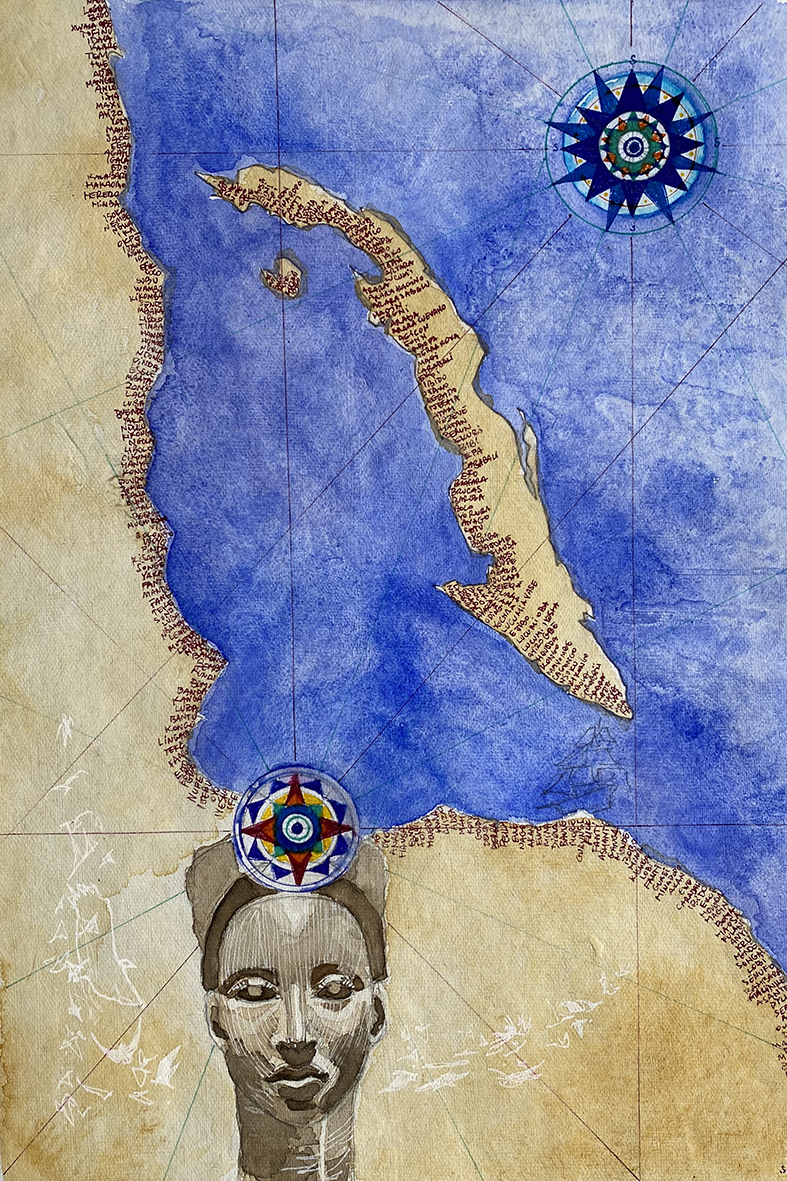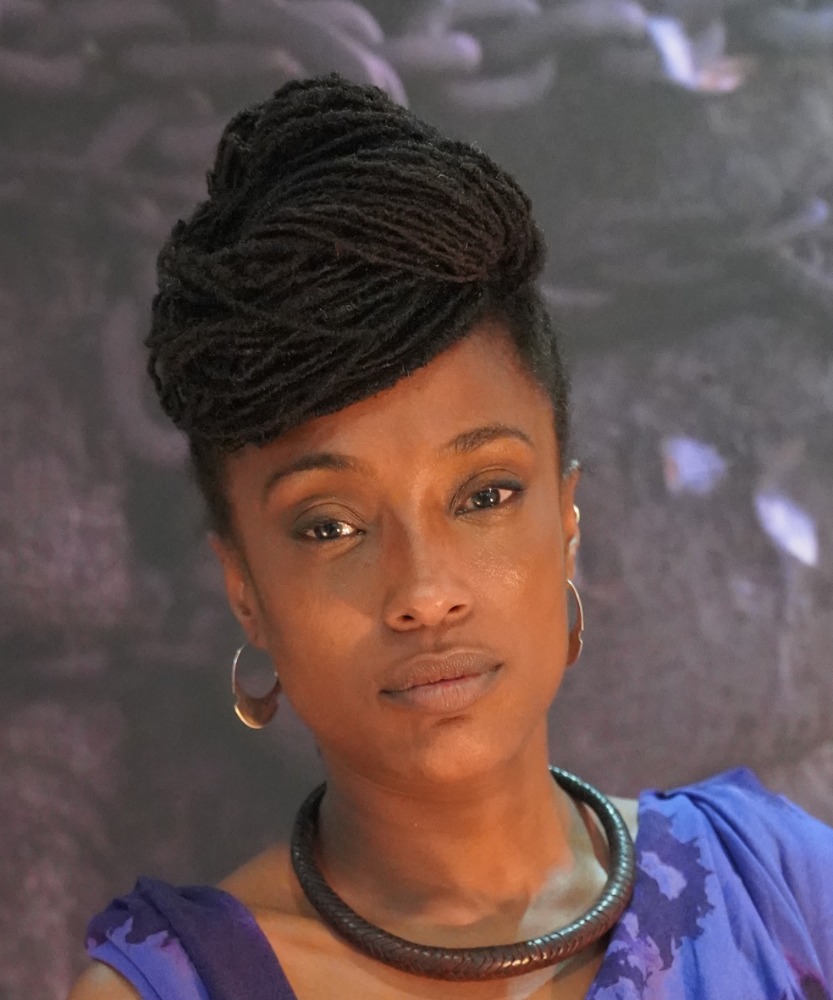The Roads of Yemoja
Laeila Adjovi
“She says she is proud that her faith has ‘spread and multiplied’ throughout the world. Ouidah, Benin.”
- Laeila Adjovi

Laeila Adjovi’s photograph of Denandi as a Mamissi - a Mami Wata worshipper-ties in to this theme of migration, resilience, and spiritual continuity across the African diaspora. Mami Wata is a water deity (Yemọja is her Yoruban equivalent), and the worship of both deities survived the horrors of the Middle Passage and evolved on the other side of the Atlantic, thus coming to symbolise the resilience of African spiritual traditions. Whilst Mami Wata and Yemọja originate in different spiritual systems, both embody the water element as a transformative power and are linked to the maternal figure.
The image of Denandi represents the syncretic fusion of African spiritual systems and underscores how cultural memory and spiritual heritages have travelled and adapted through the African diaspora. By incorporating these water deities, the exhibition further explores the concept of migration not only as physical movement but as a spiritual and cultural journey that has shaped African identity across time and space. In this way, the artworks, like the kitchen itself, become entry points into a larger narrative of resilience, survival, and the nourishment that comes from remembering and retelling our stories.
The image of Denandi represents the syncretic fusion of African spiritual systems and underscores how cultural memory and spiritual heritages have travelled and adapted through the African diaspora. By incorporating these water deities, the exhibition further explores the concept of migration not only as physical movement but as a spiritual and cultural journey that has shaped African identity across time and space. In this way, the artworks, like the kitchen itself, become entry points into a larger narrative of resilience, survival, and the nourishment that comes from remembering and retelling our stories.
Denandi’s own words resonate deeply with this message. She proudly states that her faith has “spread and multiplied” throughout the world, reflecting the exhibition’s focus on transgenerational conversations and the importance of storytelling. Her statement mirrors the exhibition’s celebration of how African spiritual practices—like the veneration of Mami Wata and Yemọja—have evolved across geographical borders. This spread of faith and tradition represents the survival and strength of African cultures, which, despite the trauma of forced migration, continue to thrive and grow globally.
Adjovi’s work, The Influence of Ifẹ̀, Map on Parchment (2018), is key to the exhibition’s theme of migration. The richly symbolic map depicts the physical journeys of Africans during the transatlantic slave trade as well as the spiritual, cultural, and intellectual elements they carried with them. In her accompanying poem, Adjovi asks what Africans brought with them and answers: “Their knowledge. | Their culture. | The dignity they were being denied. | The deities they had on their ‘ori’ (head).” These words express the unseen but powerful aspects of identity that have endured and transformed over time
Adjovi’s work, The Influence of Ifẹ̀, Map on Parchment (2018), is key to the exhibition’s theme of migration. The richly symbolic map depicts the physical journeys of Africans during the transatlantic slave trade as well as the spiritual, cultural, and intellectual elements they carried with them. In her accompanying poem, Adjovi asks what Africans brought with them and answers: “Their knowledge. | Their culture. | The dignity they were being denied. | The deities they had on their ‘ori’ (head).” These words express the unseen but powerful aspects of identity that have endured and transformed over time

What did Africans bring with them as they
were forced to cross the sea during the
Transatlantic slave trade?
Their knowledge.
Their culture.
The dignity they were being denied.
The deities they had on their ‘ori’ ( head).
- Laeila Adjovi
Also featured in the exhibition is an 8’40” min sound installation by Adjovi titled Atunwa (2018). Edited by the artist, this piece is derived from an original Senegalese soundtrack titled Gëëj by musician Daba Makourejah, accompanied by the chants of Afrekete from Suilen Mercedes Torres Mederos and her mother, Teresa Mederos Gomes (Cuba). The work deepens the exhibition’s exploration of migration and resilience, reflecting the spiritual continuity between African and Afro - Cuban traditions. This piece honours the resilience of ancestral knowledge and spiritual practices. The Oberere chant, likened to a bird’s cyclical return, echoes the journeys of enslaved Africans, who, in body or spirit, always find their way home.

Laeila Adjovi
BeninLaeïla Adjovi (b. 1982) is a Beninese-French artist and storyteller based in Senegal. She is a writer, photographer, visual artist, and researcher. Her favourite themes revolve around borders, hybridity, multilayered identities, and the transmission of African cultural heritage through women.In 2018, she was the recipient of the Leopold Sedar prize of the Dakar art biennial for her photography and poetry project ‘Malaïka Dotou Sankofa’. In recent years, her work has been exhibited internationally, including in Senegal, Ethiopia, Morocco, Benin, France, South Africa, the United States, the UK, Cuba, and Taiwan.
Since late 2018-early 2019, she has been working between Nigeria, Benin, and Cuba on a transdisciplinary project around the rites of Yoruba and Ewe-Fon deities revered on both sides of the Atlantic. This academic and artistic exploration has led her to start writing a PhD in 2021. Her thesis is titled ''The Roads of Yemoja: Nomadic Spirituality, Oral Transmission, and Cultural Resistance.”

